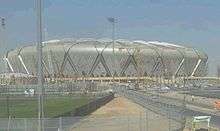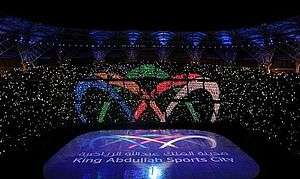King Abdullah Sports City
| KASC | |
 | |
| Full name | King Abdullah Sports City Stadium |
|---|---|
| Location | North of Jeddah, Saudi Arabia |
| Coordinates | Coordinates: 21°45′47.6″N 39°9′51″E / 21.763222°N 39.16417°E21°45′47.6″N 39°9′51″E / 21.763222°N 39.16417°E |
| Owner | Saudi Aramco |
| Operator |
Saudi Aramco Al Muhaidib Contracting Company[1] BESIX[2] |
| Capacity | 62,241 (seated) |
| Record attendance | 62,241(Al-Ahli vs. Al-Shabab, 1 May 2014) |
| Field size | (3,000,000) square meter [3] |
| Surface | Grass |
| Scoreboard | Yes |
| Construction | |
| Built | 2012–2014 |
| Opened | May 1, 2014[4][5] |
| Construction cost | $560 million |
| Tenants | |
| Al-Ahli, Al-Ittihad | |
King Abdullah Sports City (Arabic: مدينة الملك عبدالله الرياضية), also nicknamed The Shining Jewel, in Arabic (al-Jawhara Al-Moshe'ah) (Arabic: الجوهرة المشعة) or simply The Jewel, in Arabic (al-Jawhara) (Arabic: الجوهرة), is a new multi-use stadium and sports city located 60 kilometers north of Jeddah, Saudi Arabia. The City was named after Abdullah, King of Saudi Arabia when the stadium opened.[6]
The main stadium (King Abdullah International Stadium) is used for football, reaching a full capacity of 62,241 spectators. It is the biggest stadium in Jeddah, and the second biggest in Saudi Arabia, coming after Riyadh's King Fahd Stadium. Additionally, it is the 10th biggest stadium in the Arab world. Accompanying the innovative stadium are smaller sports venues surrounding the main stadium. It also hosts athletics and indoor sporting events in indoor arenas.
The bid for the construction was won by Saudi Aramco and the contractor for this project was a joint between Al Muhaidib Contracting Company & BESIX Construct.[7]
The contract for providing the stadium safety, security, traffic management and contingency plans was awarded to a UK Company, Crowd Management UK Limited who are also the lead security and traffic management consultants for The R&A who host The Open Championship annually. In addition to the written plans Crowd Management UK delivered a training course for key stadium operators at the Saudi Aramco training facility in Jeddah KSA.
The company also provided an independent evaluation of the performance of local staff and the event safety officer (provided by Sword Security) during the inaugural event at the KASC stadium. This led to a significant number of safety and security recommendations and the appointment of a dedicated Stadium Manager.
Background and construction
The idea of a new large stadium in the city of Jeddah was put and considered in the late 90s, and was always anticipated by Saudi soccer fans. In 2012, the new stadium's construction began. Before the stadium was launched officially in 2014, Jeddah's main stadium was Prince Abdullah Al Faisal Stadium, accommodating a capacity of 24,000 and hosting numerous great matches and events in Saudi football history throughout decades. The new stadium is considered to be one of the most major items coming out of Saudi football recently, and has been widely acclaimed and praised for its elegance.
Opening ceremony

The city opened officially on May 1, 2014 hosting the final of the 2014 King's Cup tournament between Jeddah's Al-Ahli SC and Riyadh's Al-Shabab.[8] In a hometown upset, Al-Shabab won 3-0, and were crowned their 3rd King's Cup championship.[9] The match was attended by then-King Abdullah, along with then-Crown Prince Salman and then-Deputy Crown Prince Muqrin.
For this Inaugural fixture safety and security plans were designed and implemented by Mr. Sol N'Jie and Mr. David Storr representing Sword Security, based in Ireland. Mr. Storr was the event safety officer.
Over 62,241 diverse fans filled the stadium. The tickets for the match were free, which resulted in many citizens resorting to black market, some even buying and selling tickets for as much as 2,500 Saudi Riyals. It was also reported that many fans were able to enter without any tickets and the capacity could not be accurately counted.
There were numerous casualties as a result of crowd disorder and flares and objects rained down on the playing surface when the opposing teams and officials emerged to inspect the playing surface. Saudi football enthusiasts have voiced their displeasure regarding this, and many believed that the event was unorganised.
After the match, a traditional Saudi Arabian festival was held on the pitch. During the ceremony, 10-year-old boy Faisal Al-Ghamdi presented a crystal ball to the King. He then received a gift from the King, a luxurious pen. In an interview following the ceremony, Al-Ghamdi told Okaz newspaper that "It was the most valuable gift I have received all my life." Al-Ghamdi said he was honored to be selected for this task and to greet the King. "It was one of my dreams to stand before Custodian of the Two Holy Mosques. And with this, I’ve achieved it," he said. Al-Ghamdi was selected among 170 children for his part in the ceremony. The King of Saudi Arabia later gave a speech acknowledging his people, congratulating them, and saying that they "deserve so much more". The ceremony lasted an hour and a half and ended with fireworks. It was considered to be one of the greatest sports-related events in the history of Saudi Arabia. The music for the ceremony was composed by Max Herman.
Facilities
Outside the main stadium, the city has three separate football fields and four small indoor arenas also used for football. It also has six tennis courts, and a large indoor arena for sports and other purposes. The city also has a main mosque, and six separate smaller mosques. The city is also equipped with a comprehensive media center, in which spacious rooms are used to broadcast press conferences for players, coaches, and football personalities.
Tickets and seating capacity
The main stadium can fit up to more than 63,241 in attendance. Seats and stands are numbered and divided in a professional way. The lower section of the stadium (L) contains 38 blocks accommodating 631 seats per block with a total of 24,000 seats. The middle section (M) contains 48 blocks accommodating 500 seats per block with a total of 24,000 seats. The upper and smallest section (U) has 48 blocks accommodating 291 seats per block with a total of 14,000 seats. The stadium also holds hundreds of private seats and car parking spots reserved to those of special needs.
Ticket prices for events and matches vary between 30-45 Saudi Riyals for normal seats, and 300-1,500 Saudi Riyals for VIP seats. Ticketing system has evolved and is becoming well organised. In September 2014, an online ticketing website named MAKANI (Arabic: مكاني 'my place') was launched. It allowed citizens to book, pay, and formally print their tickets for matches and other events. It has received wide praise for being efficient and easy to use.
Records

- As of May 13, 2016:
- The first match held at the stadium was between Al-Ahli and Al-Shabab in the 2014 King's Cup final on May 1, 2014.
- The first game win and championship win in the stadium was for Al-Shabab on May 1, 2014.
- The biggest attendance was 62,241 fans in the opening ceremony between Al-Ahli and Al-Shabab on May 1, 2014.
- The biggest attendance in the Saudi League was 60,134 fans in a match between Jeddah's Al-Ittihad and Riyadh's Al-Hilal on December 1, 2014. The match ended 0-0.
- The biggest attending fans are Al-Ittihad's, who have a record-breaking 42,371 average (12 matches) in the 2014/2015 Saudi League alone. Al-Ahli fans come in second with an average of 34,089 per match (13 matches)
- The first local derby was between Al-Ahli and Al-Ittihad on December 19, 2014 in the Saudi League. The match ended 1-1, with over 59,026 fans in attendance.
- The most wins in the stadium are for Al-Ahli, with 30 overall wins.
- The most losses in the stadium are for Al-Ittihad, with 12 overall losses.
- The most draws in the stadium are for Al-Ahli, with 9 overall draws.
- The first goal scored at the stadium was for Al-Shabab's Fernando Menegazzo, from a penalty kick on May 1, 2014.
- The first goal scored from open play was for Al-Shabab's Muhannad Assiri, on May 1, 2014.
- The first hat-trick scored in the stadium was for Omar Al Soma, in a match against Hajer on August 16, 2014.
- The first red card was endured by Al-Ahli's defender Aqil Balgeeth on May 1, 2014.
- The biggest win for a home team was achieved twice by Al-Ahli, 6-1 vs. Hajer on August 16, 2014 and 5-0 vs. Al-Fateh on April 28, 2015, and once by Al-Ittihad, 5-0 vs. Hajer on December 10, 2015.
- The heaviest defeat suffered by a home team was on May 8, 2016 when Al Ittihad lost 5-0 to Al-Nassr.
- The biggest scoring was Al-Ittihad 6-2 Al-Raed on February 4, 2016.
List of matches
- As of May 13, 2016:
- 1.^ Naft Tehran won 2-2 on away goals rule, as they defeated Al-Ahli 1-0 in Iran.
References
- ↑ http://www.muhaidibco.com.sa/
- ↑ http://www.besix.com/Home.aspx
- ↑ استاد الملك عبدالله جوهرة في جيد العروس
- ↑ http://www.kasc.com.sa
- ↑ http://www.worldofstadiums.com/asia/saudi-arabia/king-abdullah-sports-city-stadium-jeddah/
- ↑ Arab News: King Abdullah Sports City debuts on May 1
- ↑ http://www.bam-sports.de/en/node/159
- ↑ "Al Ahli vs Al Shabab - Saudi Arabia Pro League Head to Head (H2H) Statistics and Match Preview - SoccerPunter.com". www.soccerpunter.com. Retrieved 2016-11-22.
- ↑ "Al Ahli vs Al Shabab - Saudi Arabia Pro League Head to Head (H2H) Statistics and Match Preview - SoccerPunter.com". www.soccerpunter.com. Retrieved 2016-11-22.
External links
| Wikimedia Commons has media related to King Abdullah Sports City. |